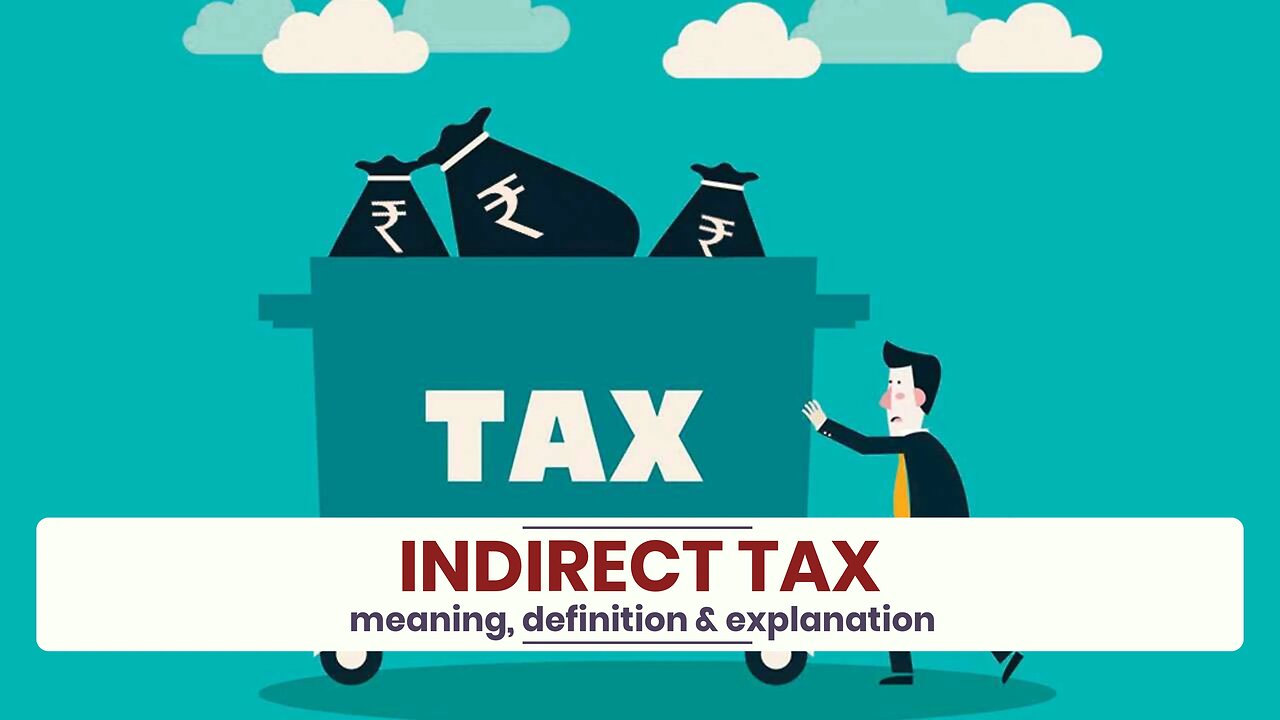Premium Only Content

What is INDIRECT TAX
✪✪✪✪✪
http://www.theaudiopedia.com
✪✪✪✪✪
What does INDIRECT TAX mean? INDIRECT TAX meaning - INDIRECT TAX definition - INDIRECT TAX explanation. What is the meaning of INDIRECT TAX? What is the definition of INDIRECT TAX? What does INDIRECT TAX stand for? What is INDIRECT TAX meaning? What is INDIRECT TAX definition?
An indirect tax (such as sales tax, per unit tax, value added tax (VAT), or goods and services tax (GST)) is a tax collected by an intermediary (such as a retail store) from the person who bears the ultimate economic burden of the tax (such as the consumer). The intermediary later files a tax return and forwards the tax proceeds to government with the return. In this sense, the term indirect tax is contrasted with a direct tax, which is collected directly by government from the persons (legal or natural) on whom it is imposed. Some commentators have argued that "a direct tax is one that cannot be changed by the taxpayer to someone else, whereas an indirect tax can be."
An indirect tax may increase the price of a good to raise the price of the products for the consumers. Examples would be fuel, liquor, and cigarette taxes. An excise duty on motor cars is paid in the first instance by the manufacturer of the cars; ultimately, the manufacturer transfers the burden of this duty to the buyer of the car in the form of a higher price. Thus, an indirect tax is one that can be shifted or passed on. The degree to which the burden of a tax is shifted determines whether a tax is primarily direct or primarily indirect. This is a function of the relative elasticity of the supply and demand of the goods or services being taxed. Under this definition, even income taxes may be indirect.
The term indirect tax has a different meaning in the context of American Constitutional law: see direct tax and excise tax in the United States. In the United States, the federal income tax has been, since its inception on July 1, 1862, an indirect tax (more specifically an excise) even though during the 1940s, its application grew from a historical average of about 8% of the population paying it to around 90% of the population paying it as a measure to support the war effort.
Indirect taxation is policy commonly used to generate tax revenue. Indirect tax is so called as it is paid indirectly by the final consumer of goods and services while paying for purchase of goods or for enjoying services. It is broadly based since it is applied to everyone in the society whether rich or poor. Since the cost of the tax does not vary according to income, indirect taxation includes Ad Valorem tax and Specific tax, of which Ad Valorem(VAT, GST) is proportional and Specific tax is fixed. However, indirect taxation can be viewed as having the effect of a regressive tax as it imposes a greater burden (relative to resources) on the poor than on the rich, as both rich and poor pay the same tax tax amount for consumption of a certain quantity of a specific good. The taxpayer who pays the tax does not bear the burden of tax; the burden is shifted to the ultimate consumers. In the case of a direct tax, the taxpayer has to bear the burden of tax personally; in case of indirect tax the taxpayer and the taxbearer are not the same person.
-
 1:26
1:26
The Audiopedia
9 months agoWhat is MOTTO?
47 -
 49:44
49:44
Kyle Fortch
6 hours ago $0.30 earnedWillie Boy: New Song With Eminem, Collaborating w/ The Game, Dave East & More | THE ONE SHEET S1E12
26.4K -
 1:20:29
1:20:29
Rebel News
2 hours ago $2.24 earnedMontreal cops arrest journalist, Poll shows Cons lead, Poilievre's justice reform | Rebel Roundup
29.5K16 -
 47:28
47:28
The White House
4 hours agoBilateral Meeting with the President of the Republic of El Salvador
54.6K16 -
 1:30:21
1:30:21
The Rubin Report
4 hours agoBill Maher Reveals Details of Trump Meeting & He’s as Shocked as the ‘Real Time’ Crowd
76.6K47 -
 1:10:16
1:10:16
Flyover Conservatives
14 hours agoThe Secret Economic Weapon No One Is Talking About: The Mar-a-Lago Accord - Dr. Kirk Elliott | FOC Show
35.8K1 -
 1:03:10
1:03:10
Grant Stinchfield
3 hours ago $1.04 earnedAttack on PA Governor - Blame Conservatives as 60 Minutes Goes After Trump, Again!
23.9K1 -
 14:50
14:50
Jamesons Travels
6 hours ago $3.06 earnedUS Military's Only Fans Training Pipeline
52.3K21 -
 1:28:04
1:28:04
The Shannon Joy Show
4 hours ago🔥🔥 Shock Video - Bill Maher Exposes #RealityDC & The UNIPARTY Fraud In One Revealing Monologue On Trump! 🔥🔥
28.4K7 -
 2:24:20
2:24:20
Benny Johnson
4 hours ago🚨Trump Savaging Reporters LIVE Now in Oval Office
144K68